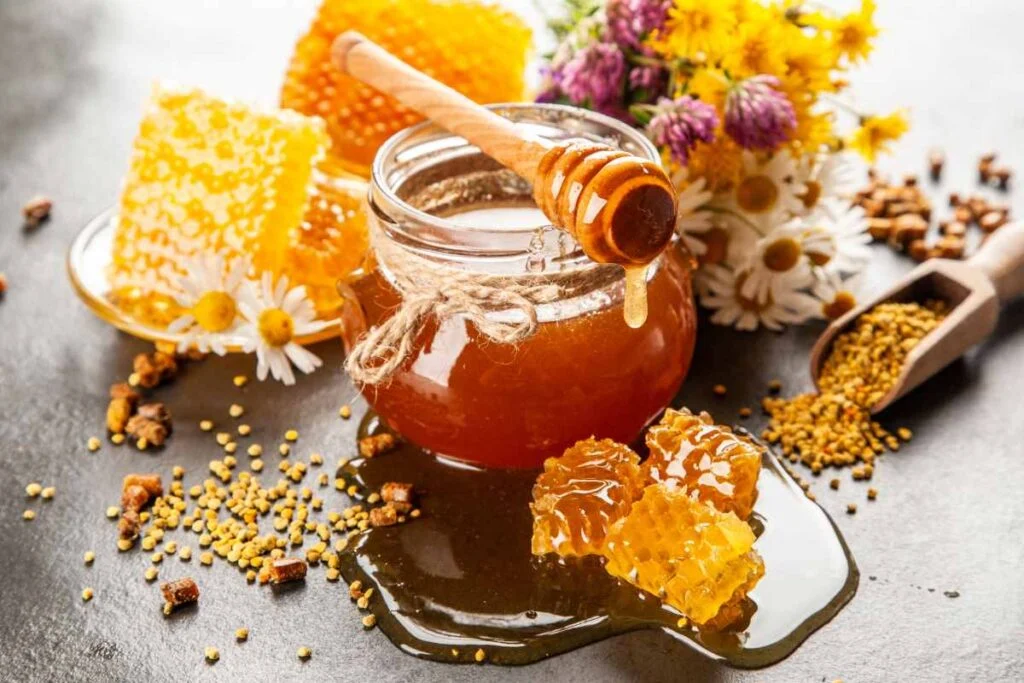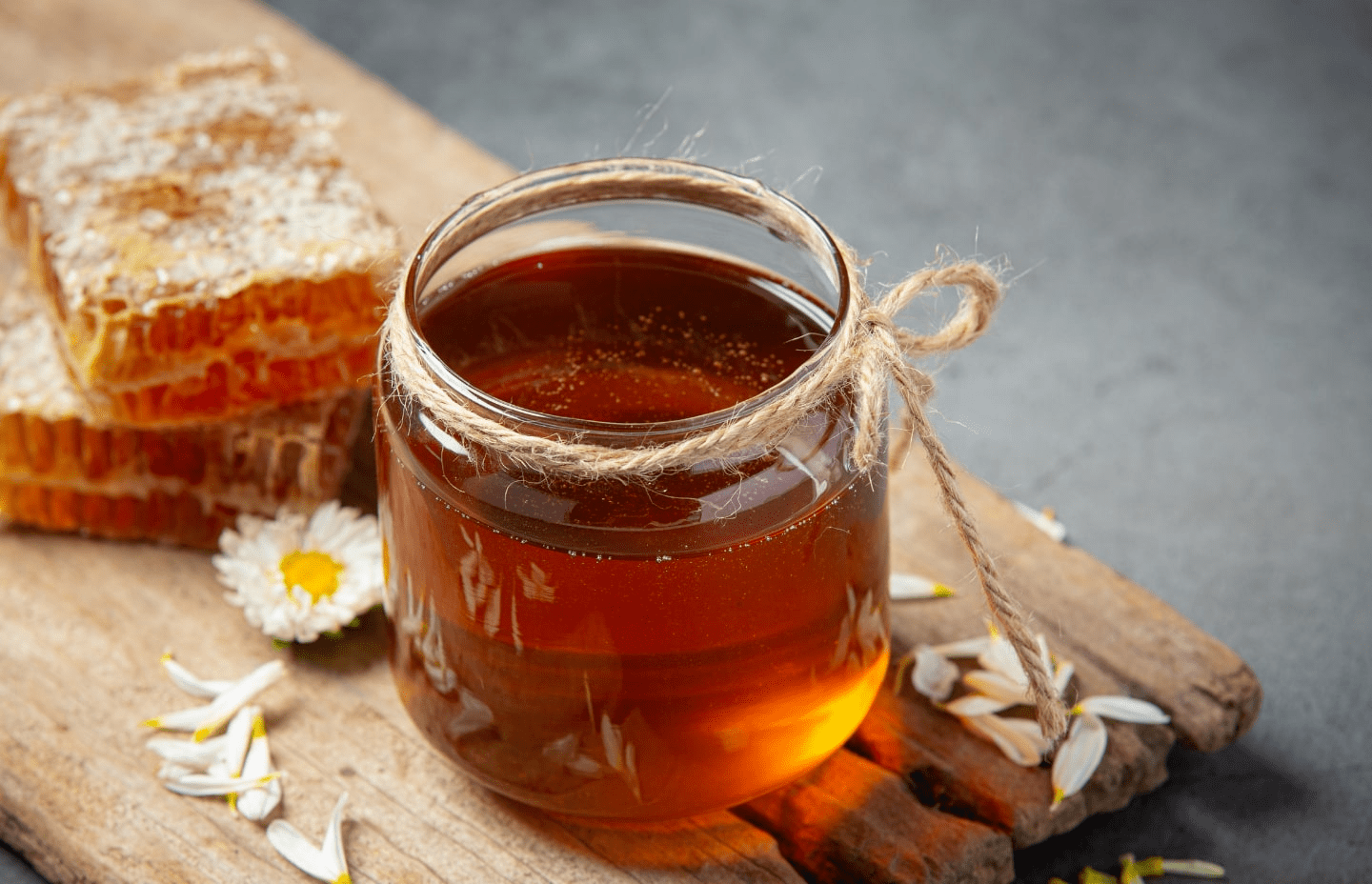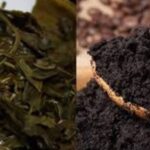Raw honey is extracted from the honeycomb. The honey is extracted from the combs and poured onto a mesh or nylon cloth to separate it from impurities such as beeswax and dead bee parts. Once filtered, the raw honey is bottled and ready to be enjoyed.
Raw honey boasts a higher nutritional profile than regular honey. It contains approximately 22 amino acids, 31 different minerals, a range of vitamins, and enzymes. Most impressively, raw honey contains nearly 30 biologically active plant compounds, known as polyphenols, which act as antioxidants.
Numerous studies have linked these antioxidants to impressive health benefits, including reduced inflammation, a lower risk of heart disease, and certain cancers. One study compared the antioxidants in raw honey to processed honey from a local market and found that raw honey contained up to 4.3 times more antioxidants.

Raw honey offers more nutritional benefits than regular honey.
2. Is Raw Honey Better Than Regular Honey?
Most honey found in stores is pasteurized. The high heat of pasteurization kills unwanted yeast, improves the color and texture of the honey, removes any crystallization, and extends its shelf life. However, this process also destroys many of the beneficial nutrients found in honey.
Compared to pasteurized products, raw honey retains its nutritional value and antibacterial properties. However, because it is unpasteurized, raw honey may contain bacteria.
3. Health Benefits of Raw Honey
The nutritional content of raw honey varies depending on its source and other factors. In general, one tablespoon or 21 grams of raw honey contains 64 calories and 17 grams of sugar. Raw honey also contains small amounts of the following vitamins and minerals: calcium, magnesium, manganese, niacin, pantothenic acid, phosphorus, potassium, riboflavin, and zinc. Raw honey also contains varying amounts of amino acids, enzymes, and other beneficial compounds.
If you’re considering using raw honey, purchase it from a trusted source. Here are some of the health benefits associated with raw honey:
3.1. A Good Source of Antioxidants
Raw honey contains a range of plant chemicals that act as antioxidants. Antioxidants help protect the body from cellular damage caused by free radicals.
Free radicals are unstable atoms that contribute to aging and cellular damage through oxidative stress, which can promote the development of chronic diseases such as cancer and heart disease. Research suggests that the antioxidants in raw honey, known as polyphenols, have anti-inflammatory properties that may be beneficial in protecting against some of these conditions.
Some types of honey have higher antioxidant levels than fruits and vegetables. Raw honey may also contain bee pollen and propolis, which can offer additional benefits. A 2023 research review suggested that raw honey could have potential protective effects on the respiratory, digestive, cardiovascular, and nervous systems and even potential in cancer support.
3.2. Antibacterial and Antifungal Properties
Research has also shown that propolis in raw honey, a waxy substance made from bee saliva, beeswax, and plant material, has antifungal and antibacterial properties.
The effectiveness of honey as an antibacterial or antifungal agent varies depending on the type, but researchers are exploring some varieties for specific treatment purposes, such as fighting infections related to Candida.
3.3. Wound Healing
Honey has antibacterial properties. In particular, medical-grade Manuka honey can inhibit the growth and target a range of different bacterial strains.
However, research from 2022 suggested that both Manuka and non-Manuka honeys could have potential health benefits in inhibiting bacteria and wound healing.
It’s important to remember that the honey used in the studies was medical-grade, meaning it had been tested and sterilized. Therefore, store-bought honey should not be used for treating wounds. Always consult a healthcare professional before using honey for any medical purpose.
3.4. Rich Source of Phytonutrients
Phytonutrients are compounds found in plants that help protect them from harm. Some repel insects or protect the plant from ultraviolet radiation.
The phytonutrients in honey have antioxidant, antibacterial, and antifungal properties. They may also be the reason why raw honey has shown immune-boosting and cancer-fighting benefits. The heavy processing of regular honey can destroy these valuable nutrients.
3.5. Digestive Support
People sometimes use honey to treat digestive issues like diarrhea, although research on its effectiveness is limited.
Studies have shown that oregano honey, in particular, may have potential in treating Helicobacter pylori (H. pylori) bacteria, a common cause of stomach ulcers.
Raw honey also contains beneficial prebiotics, which feed the good bacteria in the gut. A healthy gut microbiome is crucial for digestion and overall health.

If honey suddenly changes color or develops an odd smell, discontinue use.
3.6. Soothing Sore Throats and Coughs
Honey is a traditional remedy for sore throats, helping to soothe the pain and may aid in cough suppression. When you have a cold, add honey to hot tea with lemon.
While more research is needed, a 2021 review suggested that honey may be superior to some other care methods in improving upper respiratory tract infections. The study also showed that the antibacterial and anti-inflammatory properties effectively reduced night-time cough and other common cold symptoms.
3.7. Brain Benefits
The antioxidant and anti-inflammatory effects of honey may benefit multiple parts of the body, including brain health. Raw honey may even offer some cognitive benefits. A 2022 research review suggested that honey could: support memory function, provide neuroprotective effects and defend against the impact of oxidative stress in the brain, reduce the risk of metabolic syndrome, which can increase the likelihood of developing neurodegenerative diseases like Alzheimer’s, improve mood and stress levels.
However, more human studies are needed to fully substantiate these benefits.
4. Are There Any Risks Associated with Raw Honey?
In addition to its beneficial nutrients and prebiotics, raw honey may carry harmful bacteria such as Clostridium botulinum. This is particularly dangerous for infants. Both raw and pasteurized honey are unsafe for infants as they can cause botulism poisoning. The Centers for Disease Control and Prevention (CDC) recommends never giving honey to infants under one year old due to the risk of infant botulism.
Additionally, individuals with compromised or weakened immune systems may need to avoid raw honey, and it should also be avoided if you are allergic to honey or bee pollen.
Honey can become contaminated in certain circumstances. Store honey in a sealed container, away from light and extreme temperatures. If honey suddenly changes color or develops an odd smell, discard it. Raw honey does not need to be refrigerated as this can cause it to thicken and change texture.
What are the benefits of adding raw honey to grapefruit juice?
The Magic of Tea: Discover the Surprising Uses of Tea Beyond the Cup
The humble tea bag, often discarded after a single use, is actually a treasure trove of nutrients and beneficial compounds. Green tea, in particular, offers a plethora of health benefits, and with a little creativity, we can fully utilize every tea leaf to its maximum potential, thus saving money and optimizing the value of our tea.





































